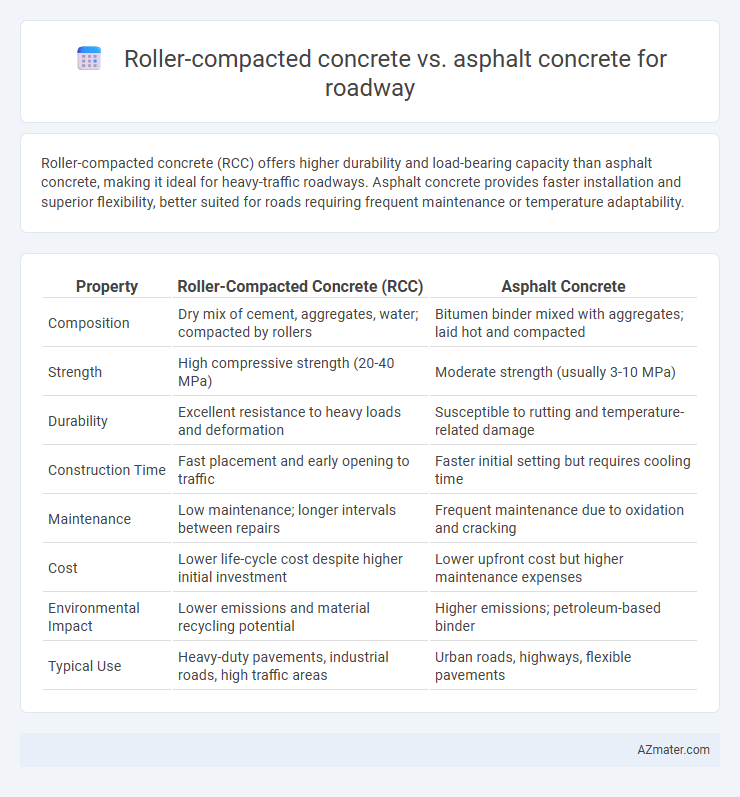Roller-compacted concrete (RCC) offers higher durability and load-bearing capacity than asphalt concrete, making it ideal for heavy-traffic roadways. Asphalt concrete provides faster installation and superior flexibility, better suited for roads requiring frequent maintenance or temperature adaptability.
Table of Comparison
| Property | Roller-Compacted Concrete (RCC) | Asphalt Concrete |
|---|---|---|
| Composition | Dry mix of cement, aggregates, water; compacted by rollers | Bitumen binder mixed with aggregates; laid hot and compacted |
| Strength | High compressive strength (20-40 MPa) | Moderate strength (usually 3-10 MPa) |
| Durability | Excellent resistance to heavy loads and deformation | Susceptible to rutting and temperature-related damage |
| Construction Time | Fast placement and early opening to traffic | Faster initial setting but requires cooling time |
| Maintenance | Low maintenance; longer intervals between repairs | Frequent maintenance due to oxidation and cracking |
| Cost | Lower life-cycle cost despite higher initial investment | Lower upfront cost but higher maintenance expenses |
| Environmental Impact | Lower emissions and material recycling potential | Higher emissions; petroleum-based binder |
| Typical Use | Heavy-duty pavements, industrial roads, high traffic areas | Urban roads, highways, flexible pavements |
Introduction to Roller-Compacted Concrete and Asphalt Concrete
Roller-compacted concrete (RCC) is a robust, zero-slump concrete commonly used for roadways, offering high compressive strength and rapid construction due to its dry consistency and compaction with rollers. Asphalt concrete consists of aggregates bound with bitumen, providing flexible pavement with excellent skid resistance and ease of maintenance. Both materials serve critical roles in infrastructure, with RCC favored for heavy-duty applications and asphalt preferred for smoother ride quality and faster repairs.
Material Composition and Properties Comparison
Roller-compacted concrete (RCC) consists primarily of a dry mix of cement, aggregates, and minimal water, resulting in a dense, stone-like structure known for high compressive strength and durability. Asphalt concrete is a blend of bitumen binder and aggregates, offering flexibility, improved skid resistance, and better performance under thermal variation but lower compressive strength than RCC. The rigid nature of RCC provides excellent load-bearing capacity and resistance to rutting, whereas asphalt's viscoelastic properties allow for easier maintenance and better noise reduction on roadways.
Construction Process Differences
Roller-compacted concrete (RCC) utilizes a drier mix spread using standard asphalt pavers and compacted with heavy rollers, allowing for faster construction and immediate traffic loading compared to traditional concrete. Asphalt concrete requires precise temperature control during mixing, transportation, and laying, with hot mix asphalt compacted through sequential rolling to achieve density and smoothness. The RCC process minimizes curing time by eliminating forms and finishing steps, while asphalt relies on continuous mixing and temperature maintenance for optimal compaction and durability.
Strength and Load-Bearing Capacity
Roller-compacted concrete (RCC) offers higher compressive strength and superior load-bearing capacity compared to asphalt concrete, making it ideal for heavy traffic and industrial roadways. RCC's dense composition and rapid curing process result in enhanced durability and resistance to deformation under heavy loads. Asphalt concrete, while flexible and easier to repair, typically exhibits lower strength and may require more frequent maintenance under high-stress conditions.
Durability and Maintenance Requirements
Roller-compacted concrete (RCC) offers superior durability compared to asphalt concrete, exhibiting higher resistance to rutting, cracking, and weather-induced degradation, making it ideal for heavy traffic roadways. RCC requires minimal maintenance due to its dense, robust structure that withstands freeze-thaw cycles and chemical spills, whereas asphalt demands regular sealing, patching, and resurfacing to maintain performance. Long-term lifecycle costs of RCC are generally lower despite higher initial investment, driven by reduced repair frequency and extended pavement lifespan.
Cost Analysis: Initial and Lifecycle Costs
Roller-compacted concrete (RCC) typically presents higher initial construction costs compared to asphalt concrete due to material composition and specialized equipment requirements. However, RCC offers lower lifecycle costs through increased durability, reduced maintenance frequency, and longer service life, often extending beyond 30 years. Asphalt concrete requires more frequent resurfacing and repairs, increasing total expenditure over time despite its lower upfront investment.
Environmental Impact and Sustainability
Roller-compacted concrete (RCC) offers enhanced durability and lower lifecycle carbon emissions compared to asphalt concrete, making it a more sustainable choice for roadways. The production of RCC requires less energy and emits fewer greenhouse gases due to reduced asphalt bitumen content and extended service life, minimizing the frequency of maintenance and repairs. Asphalt concrete, while flexible and easier to recycle, often contributes to higher urban heat island effects and requires more frequent resurfacing, increasing its overall environmental footprint.
Performance in Various Climatic Conditions
Roller-compacted concrete (RCC) offers superior durability and resistance to deformation under high temperatures and heavy traffic loads, making it ideal for hot and arid climates. Asphalt concrete exhibits better flexibility and faster repair times, which is advantageous in colder climates with frequent freeze-thaw cycles but may suffer rutting and cracking in extreme heat. The choice between RCC and asphalt concrete depends on regional climate stresses, with RCC providing long-term performance in warm, dry areas and asphalt concrete ensuring adaptability in variable or cold weather conditions.
Application Suitability and Use Cases
Roller-compacted concrete (RCC) suits heavy-duty industrial roads, ports, and airport pavements requiring high durability and load-bearing capacity due to its dense, low-slump mixture and rapid strength gain. Asphalt concrete is ideal for urban roads, highways, and residential streets with frequent maintenance needs, offering flexibility, smooth surface finish, and ease of repair under varying weather conditions. RCC's resistance to rutting and fuel spills contrasts with asphalt's superior skid resistance and noise reduction, influencing project-specific material selection based on traffic load, environmental exposure, and lifecycle cost.
Conclusion: Selecting the Right Material for Roadways
Roller-compacted concrete (RCC) offers superior durability, higher load-bearing capacity, and lower maintenance costs compared to asphalt concrete, making it ideal for heavy traffic roadways. Asphalt concrete provides greater flexibility, faster installation, and lower initial costs, which benefits rapid construction and repair projects. Choosing the right material depends on traffic volume, budget constraints, climate conditions, and long-term performance expectations.

Infographic: Roller-compacted concrete vs Asphalt concrete for Roadway
 azmater.com
azmater.com